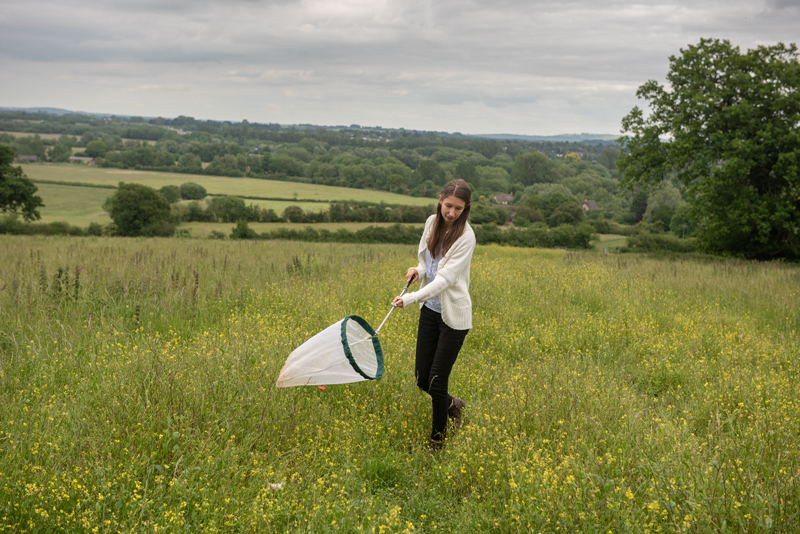The power of plant science research
Researchers in the Department of Plant Sciences are finding innovative ways to address some of our biggest challenges, from food security to environmental sustainability.
Reversing the decline of pollinators
Bees are important pollinators for many wildflowers and crops, and are essential for both a healthy environment and a healthy economy. ‘Over the past 50 years we’ve seen a dramatic decline in all insect numbers, but particularly bees and other wild pollinators,’ explains Prince of Wales’s Charitable Fund Fellow Dr Matthias Becher. ‘One of the main reasons for this is changing agriculture, but the use of pesticides, as well as pests and diseases, are also factors.’
Dr Becher builds complex computer models to better understand the way in which these factors influence colony growth and survival. Developed in collaboration with researchers around the world, the BEEHAVE models are fed with experimental data and expert knowledge in order to simulate real biological processes, such as nectar and pollen foraging behaviour in different landscapes. They are user-friendly, and freely available to download online.
‘The models enable us to look at how different factors act together, such as pesticides and food availability,’ explains Dr Becher, who took up his post at Oxford in 2018. ‘A colony has a foraging range of several kilometres, so to study these things in the field would actually be very difficult, time-consuming and expensive. Using a model means we can identify interesting factors or scenarios before committing to the actual experimental work.’
‘The models are nice educational tools, and can be used by schools to teach bee biology’
As well as serving as valuable tools for other researchers, Dr Becher’s models also contribute to the protection and enhancement of pollinator communities in agricultural landscapes. BEE-STEWARD – a recent addition to the BEEHAVE suite – allows farmers to see how pollinator-friendly land management could affect bee survival and pollination rates. The aim is to help farmers make the most of their land, both for bees and for business.
Having already produced models for honeybees and bumblebees, Dr Becher is now turning his attention to solitary bees. It’s work that 2018–19 John Oldacre Scholar Sabrina Dietz is keen to support. ‘I’d like to think that we could feed his model with the data I gathered, which will help to make it even better at predicting outcomes for solitary bees,’ she says.
 Sabrina using a net to catch bees. Photo by John Cairns.
Sabrina using a net to catch bees. Photo by John Cairns.
While at Oxford, Sabrina was investigating both the effectiveness of pollinators and the quality and quantity of nectar and pollen provided by the plant in return. Her research will assist in predicting the stability and resilience of plant-pollinator networks, as well as the way in which interactions within these networks would rewire if, for example, a particular species of plant or bee were to disappear.
Like Dr Becher, Sabrina hopes that her work – and that of future John Oldacre Scholars – will help to inform land management and conservation practices in the future. ‘If the data shows that certain pollinators prefer flowers with a specific protein and sugar content, we can say to farmers: these are the types of plants you should have in your fields in order to improve the availability of nutrients,’ she explains. ‘Of course it may turn out that bees don’t have specific preferences and that they actually love a wide range of nectar and pollen nutrients – we’ll see!’
Dr Becher and Sabrina both worked on research led by Dr Tonya Lander.
Growing better trees, faster
John MacKay, Wood Professor of Forest Science, is leading a major research project to develop genomic-based breeding methods for Sitka spruce, the UK’s third largest crop by area. Delivered in collaboration with the University of Edinburgh and Forest Research, the Sitka Spruced project aims to identify important traits – such as productivity, resistance to insect pests and tolerance of climate change – in order to make existing and future plantations more efficient and productive.
With Sitka spruce accounting for half of the UK’s £2-billion-a-year forestry industry, the potential impact of the project is significant. ‘One study suggests that growing Sitka on a 30-year cycle instead of a 40-year cycle could result in an increase of profitability between 15% and 25%,’ says Professor MacKay. ‘The other thing to keep in mind is that the UK currently produces only 40% of the wood it consumes, so if we can become less reliant on imports that would also be hugely beneficial.’
For Professor MacKay, the endowment of his post by Sir Martin and Lady Wood and the Patsy Wood Trust was an important factor in unlocking external research funding for Sitka Spruced. ‘Philanthropy has enabled me to dedicate myself to the research,’ he explains. ‘It’s also provided some financial resources to be able to hire personnel and make equipment purchases, meaning I can get projects going rapidly and efficiently. It really has been vital.’
SUPPORT PLANT SCIENCES